| |
|
Taiwan's Taoists Protest Against
Curbs on Incense and Firecrackers
July 2017 |
More than 10,000 people have marched in the Taiwanese capital
against government attempts to limit the burning of incense and paper
money during religious ceremonies.
The government has been pushing to end the practices, along with the
lighting of firecrackers, to fight pollution.
The protesters were followers of the Taoist religion. They say the
practices are a crucial element of their rituals. |
The centre of Taipei was filled with the sounds of clashing cymbals
on Sunday as people from about 100 temples took part in the
demonstration.
A 59-year-old man, who had travelled from the south of the country and
gave his surname as Cheng, told the news agency: "It is very important.
Our religion is upheld by the burning of incense." |
Joyce Wu, 34, said: "Gods can only feel our worship if we burn
incense.
"I grew up in a rural village, how come I'm healthy and not sick? I
think cars and factories cause more of a pollution problem." |
Last year during a Taoist pilgrimage, government monitors found
levels of harmful PM2.5 (particulate matter smaller than 2.5 microns in
diameter) had reached more than 60 times the World Health Organization's
recommended limit.
The government issued a statement saying it did not wish to ban the
practice, but it called on religious groups to "take appropriate
measures to reduce potential pollution".
One temple has stopped burning incense, while another has started
playing recordings of the sound of firecrackers. |
|
Hong Kong’s Taoist Funerals
Superstition - Symbolism
And how to Stop your Soul being Dragged into the
Coffin! |
|
From swordplay to sweet treats, few Chinese funeral
traditions are as involved as a Taoist Ceremony.
We find out how to "Ward Off Evil Entities" and guarantee a peaceful
afterlife for the deceased. |
| Mourners - Are dressed in loose white clothing, the women
hiding their sadness behind large pointy hoods. The ear-piercing,
discordant sound from the Suona, a woodwind instrument, is played by a
Taoist Priest. At some point, swords will be waved, tiles will be
smashed, and paper models of houses, servants and various other objects
will be set on fire. The Eerie Spectacle - A Chinese Taoist
Funeral Ceremony, with rituals, symbolism and ghostly superstitions
dating back to ancient times. The most popular choice of funeral service
in Hong Kong, the Taoist ceremony places the utmost importance on
appeasing malignant spirits to protect the soul of the deceased, and on
safeguarding mourners from the spirits’ wicked ways.
The Main Theme - Of the funeral is filial piety, which is a core
Chinese value. |
|
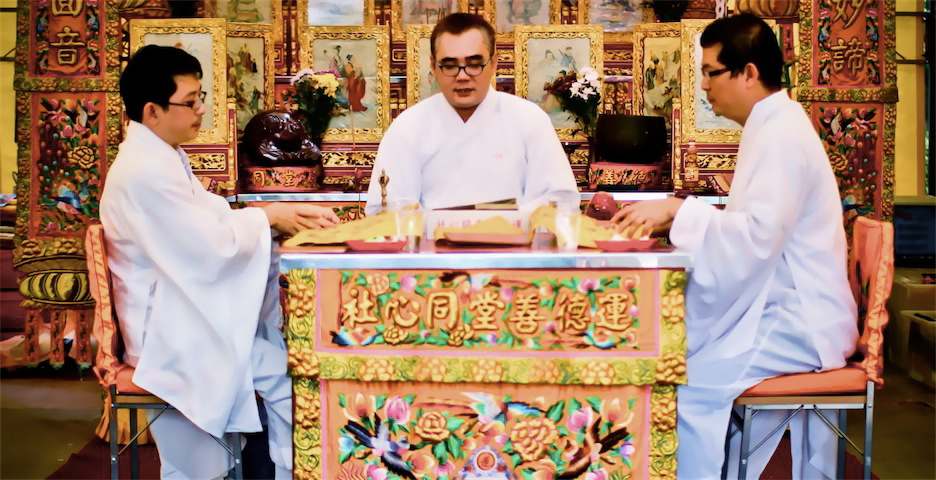 |
A Heady Odor of Incense - Fills the air, where numerous
funeral urns containing ashes reside in antique wooden compartments,
awaiting removal to a permanent resting place in a columbarium. Photos
of the departed stand beside the urns, along with offerings of
sustenance that the deceased may have enjoyed in life, such as fruits,
candies, Coke and mooncakes.
Funeral paraphernalia -Iincluding the white cotton and sackcloth
garments are worn by mourners. In the old days, the coarse, poor quality
material was chosen to convey mourners’ humble reverence for the dead.
Bright colors, particularly red, which is associated with many Chinese
celebrations, are unacceptable at a funeral.
The Men’s Mourning Costume - Also includes a white headband,
while women don a hood to hide their worn-out features. |
|
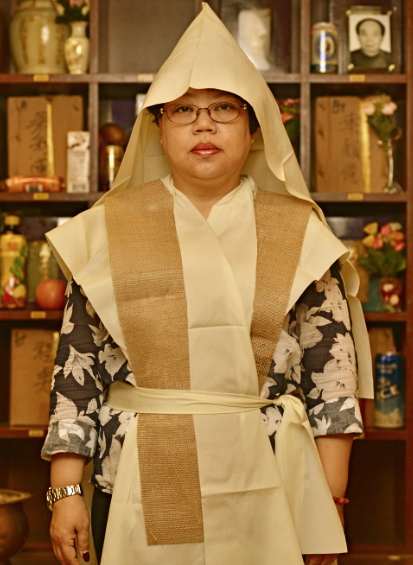 |
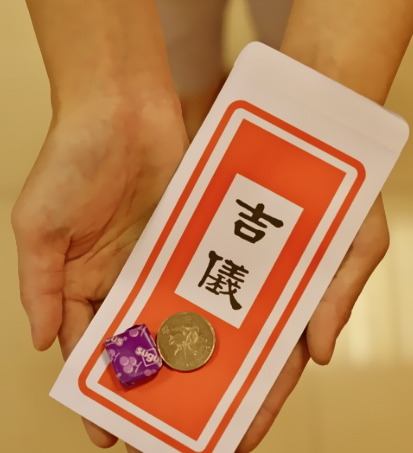 |
Flowers of Mourning - Are irises, orchids, chrysanthemums and
lilies. Wreaths include small flower baskets, often chosen by close
family members of the deceased. These are placed beneath the late family
member’s portrait at the front of the funeral hall, which implies that
the relatives are kneeling humbly. Heart-shaped wreaths are a common
choice.
Taoist Funeral Practices - Run much deeper than the material
realm, though, and the elaborate ceremony is steeped in ancient beliefs
and rituals.
Green-eyed Ghosts - May prevent their lucky companion from
leaving hell, so we have to keep them appeased.
Taoism Today - Holds that humans undergo an endless cycle of
death and rebirth. In between, the soul resides in various realms of
good and evil.
During the Service - Priests chant scriptures, their voices often
inaudible against a cacophony of drums, cymbals, suonas, erhus and
flutes, to uplift the Soul of the departed and prevent their descent
into Hell. |
|
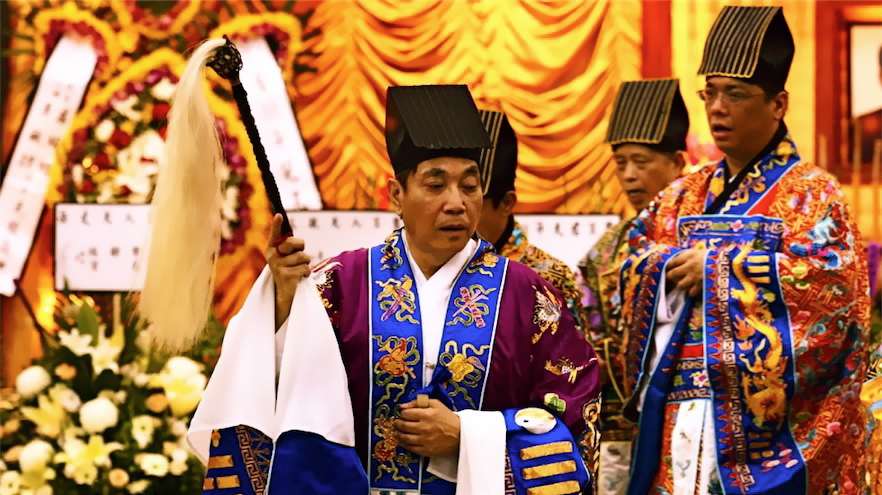 |
The Taoist Priest - Circles a fire in which nine tiles have
been placed, and flutters a sword made from peach wood, which is
believed to ward off 'Evil Spirits'. He then breaks the tiles,
which symbolize the many levels of Hell. In doing so, the priest opens
the gates of Hell to emancipate the soul. Another priest then sits on a
lotus-shaped seat beside a photo of the deceased and chants scriptures.
The Priest - Symbolically becomes the incarnation of 'Guan
Yin, the Goddess of Mercy' in Chinese mythology. She is often
depicted seated on a Lotus Flower.
On the Lotus Seat - The priest will also pray for absolution of
the sins of “other friends”. There are many abandoned souls at a funeral
that will be jealous of the dead person being prayed for. These
green-eyed ghosts may prevent their lucky companion from leaving Hell,
so we have to keep them appeased. They can be memorialized and assisted
in their rebirth by family and friends.
You never know what there will be to obstruct the path of souls in the
underworld! |
|
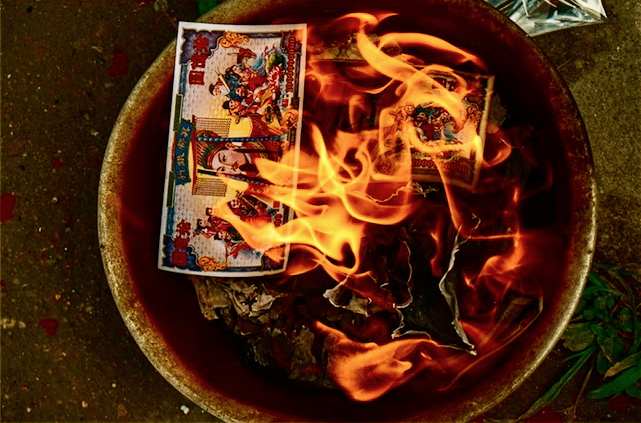 |
Mourners assist by burning joss paper. Also called “Ghost Money”.
This practice helps to buy the deceased’s escape from Hell, which
is a “Highly Corrupt Place”.
Other joss paper offerings, such as houses, servants and garments, are
burned to symbolically provide the departed with a place to live,
clothing to wear and people to take care of them in the Underworld.
They also serve as a “Golden Key” to a more prosperous afterlife.
If the dead possess more houses, servants, clothes and money, it’ll be
easier for them to meet other dead souls with a similarly wealthy
background and be accepted into their circle for an affluent rebirth.
The living are not immune to malignant spirits, and astrological beliefs
play a role in safeguarding mourners. If a guest’s Chinese zodiac sign
clashes with that of the deceased, they risk their souls being
“Dragged into the Coffin", either when the corpse is moved
from the morgue into the coffin, or when the lid of the coffin is
covered prior to the burial or cremation. In both cases, guests with
conflicting astrological signs are advised to turn their heads away, or
even leave the funeral hall. |
|
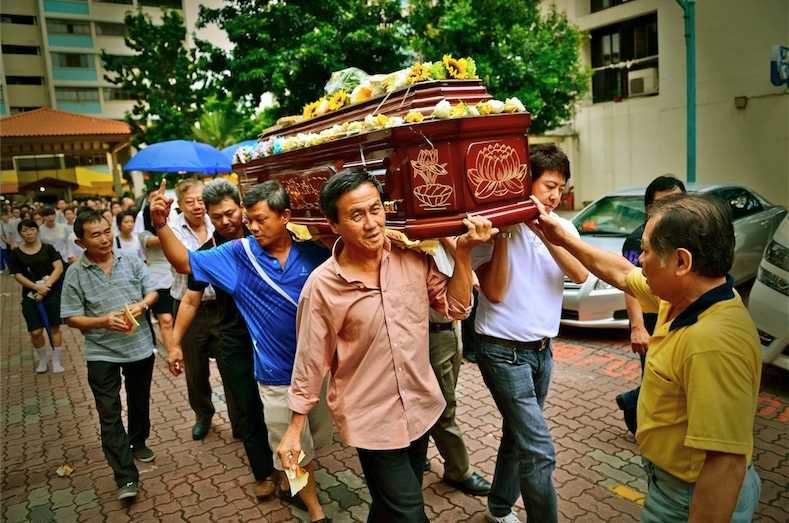 |
Beyond the Funeral’s Esoteric Rites - Family members and
guests observe long-followed social traditions. For example, guests
usually give the family a nominal sum of money in a white envelope – a
gesture dating to poorer times when this would help cover costs of the
funeral. The contribution must add up to an odd number. In Chinese
culture, an even number would represent “Double Happiness”, which
is inappropriate for the occasion.
Additionally, the figure must not end in a nine. In Cantonese, the
number is a homonym for “Long-Lasting”, suggesting that the
sombre mood will be never-ending.
Besides the money, guests can give the family another gift, but only
one. Two could be regarded as a curse on the family. You may be implying
that there are two dead people in the family.
In return, hosts hand guests a small envelope containing a one-dollar
coin and a fruit candy. A dollar was once enough for mourners to take a
bus or tram home, releasing them from the sombre occasion. The first of
the two Chinese characters which make up the word for fruit is similar
to that of a term to wish someone good health. Fruit candies also
symbolize sweetness, and can relieve guests’ bitterness.
Guests take a 'Taoist Talisman' with them when they attend a
funeral. This is a yellow piece of paper inscribed with their name,
address and birthday. When they return home, they will burn the paper at
the doorway and cross over it while it is still burning. This relates to
the belief that ghosts are fearful of fire. That way, bad joss won’t
follow them anymore, and they will not bring bad luck back home. |
|
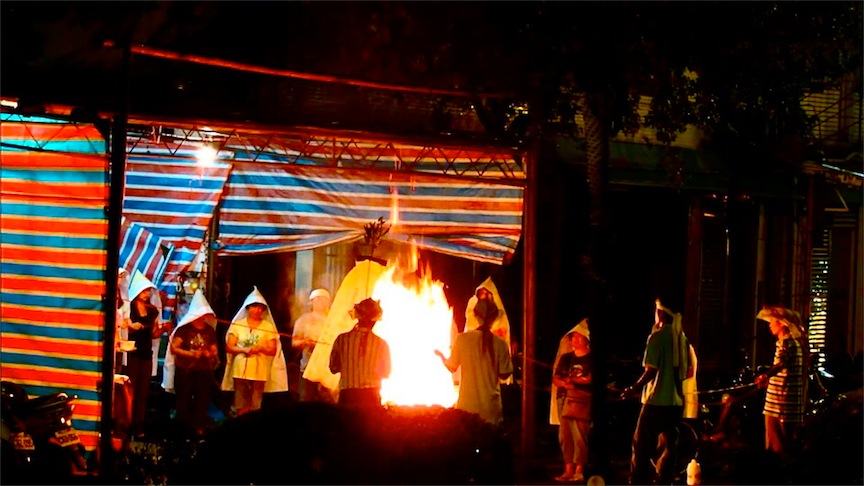 |
After the Deceased’s Body is Put to Rest - The Spirit is
welcomed once more at a feast held to thank guests for their attendance.
The gathering traditionally includes eight dishes and a dessert, which
is usually “Sugar Water”, a sweet, warm soup. The dessert is to
be eaten first to bring sweetness and happiness to the occasion.
Eight Dishes are Served - Because in Chinese the number
rhymes with a word for good fortune. The dishes tend to comprise
primarily fish and meat, but beef and horse meat are forbidden.
There are two powerful ‘Ghost Officers in the Underworld', one
with an ox-like head and the other a horse-like face. So, we mustn’t eat
them.
Final Honor to the Departed - One seat at the feast must be left
empty, complete with cutlery on the table in front. This is to welcome
the Spirit of the dead relative to join the family for one last supper.
Most Importantly - As a sign of respect, each time a new dish
arrives the invisible VIP must be served first. |
|
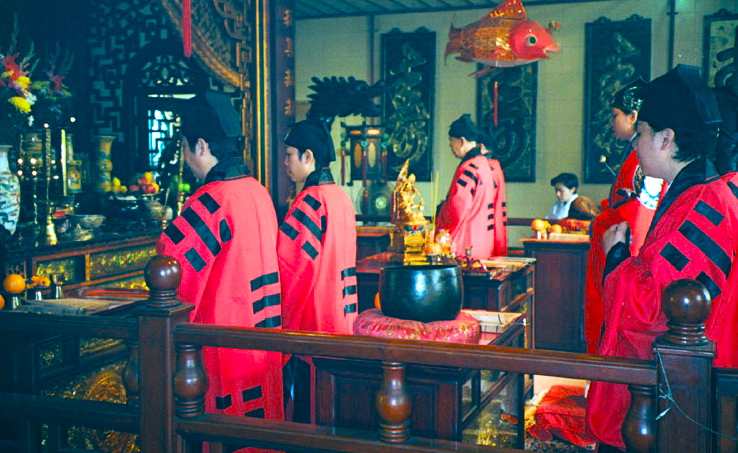 |
|
 |
|
Taoist Ritual
Thailand Vegetarian Celebration
"Nine Emperor Gods Festival" |
|
At a Temple on the Outskirts of
Phuket's Main Town
Dozens of People put Themselves to the Test |
Many Chinese communities across Southeast Asia go vegetarian for the
annual Taoist Nine Emperor Gods Festival, and locals in Phuket
are going the extra mile.
Throughout the week people show their religious devotion through
ritualistic self-mutilation and pain trials, including running over hot
coals and piercing their bodies. |
Facing their Fears! - Swords, axe handles, kebab skewers and
even a model boat were among the bizarre array of objects pushed through
devotees' cheeks as southern Thailand's gruesome vegetarian festival got
under way.
Tropical Island of Phuket - Best known to holiday makers for its
parties and beaches, but it boasts a sizeable Chinese population, most
of whom trace their roots back to Hokkien speaking areas of China's
southeast. |
A 'Devotee of the Nine Emperor Gods' sits with colored yarn through
large piercings in his face during the annual Phuket Vegetarian Festival
in the southern province of Phuket on October 1st, 2016.
Dressed in flowing robes they worked themselves into a 'Trance Frenzy'
against a constant backdrop of drums, a status that allows
them to feel no pain. |
|
The Test - Man with a Sword being 'Pushed Through'
his Face |
One man shook his head from side to side before another created a
hole in his cheek with a large metal spike, watched over by medics.
The bowsprit of a large model boat was then threaded through the hole
before he joined a parade through town to show off their new facial
accessories. |
|
Spectators were Surprised by the Lack of Blood! |
|
Participants must Adhere to a 'Series of Strict
Rules' throughout the Festival
Including - Abstinence from Sex, Drinking and Gambling |
|
Devotees who Choose to Self Mutilate |
|
Later in the Week
Some also Test Their Faith - By 'Running Barefoot across Burning
Coals' or 'Climbing Bladed Ladders' |
|
Festival Emphasizes Purification
Embodied by the 'Giving up of Meat' for Nine Days and 'Dressing in
White' |
Local Folklore - Has it that the island began celebrating the
Vegetarian Festival en masse after 1825 when illness struck a visiting
opera troupe from China.
The stricken troubadours adopted a vegetarian diet, paid homage to the
Nine Emperor Gods and were miraculously cured. |
|
Hundreds of Taoists Yearly
Pilgrimage
Traditional Ceremony at Laojun Mountain |
|
Taoists - 'Move Forward on their Knees' up the
'Steep Stairs' during the Pilgrimage |
|
Laojun Mountain in Luoyan - Central China’s Henan
Province |
|
This Mountain is Especially Sacred
to Lao Tzu |
|
The Mountain is Well-known as Once Being the
Retreat of Lao Tzu
The 'Great Chinese Philosopher' and the 'Founder of Taoism' |
|
Taoists - Across the Country Pay
Homage to the Laojun Temple
At the Top of the 2,200-meter-tall Mountain |
|
